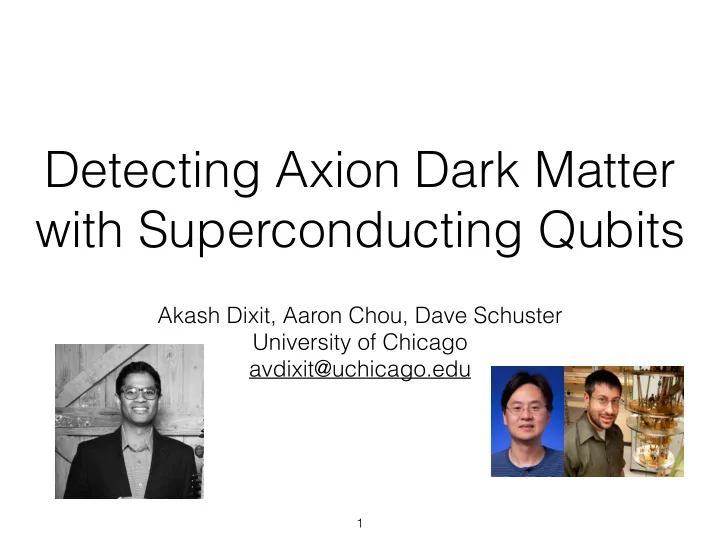

Detecting Axion Dark Matter with Superconducting Qubits Akash Dixit, Aaron Chou, Dave Schuster University of Chicago avdixit@uchicago.edu 1
Axion Dark Matter • Broken U1 symmetry introduced to solve Strong CP problem (Peccei & Quinn) • Boson from symmetry breaking may be Dark Matter • Behaves as a coherent wave over distances larger than experiment (~100m) 2
Axion-Photon Conversion L ∼ ga E · B ∼ g ∂ a ( t ) ∂ t B 0 ( x ) · A ∼ J a · A 3
Microwave Receiver Use axion induced current to drive cavity f ∼ m a Currently operating ~1GHz, R&D ~10GHz 4
Single Photon Counting 5
Harmonic Oscillator + Two Level System H = ω c a † a + ω q σ z + 2 g 2 ∆ a † a σ z : cavity-qubit coupling g ∆ = ω q − ω c detuning χ = g 2 Stark Shift ∆ 6
Experimental Procedure Axion induced current Cavity occupation shifts pumps cavity with photon qubit transition H = ω c a † a + ( ω q + 2 g 2 ∆ a † a ) σ z Excite qubit at Measure flipped qubit by shifted frequency monitoring cavity line shift H = ( ω c + 2 g 2 ∆ σ z ) a † a + ω q σ z 7
Cavity Design H = ω c a † a 10mm 8
Cavity Mode 9
Custom Atom H = ω q σ z Design your own - Frequency - Dipole Moment Harmonic Oscillator (LC) + nonlinearity (Josephson Junction) ω q = E 1 − E 0 10
Pritzker Nanofab Lab @UChicago Fluorine Etcher Electron Beam Lithography Not pictured: -Double Angle Evap -Thermal Evap -Dicing Saw Optical Direct Writer -SEM -Sputter Coater 11
Qubit m µ 0 2 × m µ 0 2 m m 1 12mm Nb optically patterned and etched to Qubits on wafer form dipole arms and capacitive pads 12
Qubit a. a. Electron beam junction patterning b. Scanning electron microscopy c. Josephson Junction 20µm b. c. 253 nm 1 µm 260 nm Josephson Junction 13
Cavity + Qubit H int = 2 g 2 ∆ a † a σ z g ∼ d · E ( x ) Dipole arms + qubit location in cavity set qubit-cavity coupling 14
Bare Qubit ω q 15
Experimental Procedure Axion induced current Cavity occupation shifts pumps cavity with photon qubit transition H = ω c a † a + ( ω q + 2 g 2 ∆ a † a ) σ z Excite qubit at Measure flipped qubit by shifted frequency monitoring cavity line shift H = ( ω c + 2 g 2 ∆ σ z ) a † a + ω q σ z 16
Cavity Dependent Qubit ω q Cavity occupation | n = 0 i ω q − χ shifts qubit transition | n = 1 i ω q − 2 χ χ ∼ 15 MHz | n = 2 i 17
Qubit Interrogation ω q − χ | n = 1 i Apply pi pulse at π shifted qubit frequency 18
Confirm Qubit Flip w/ Cavity χ ∼ 15 MHz Measure excited qubit by monitoring cavity line shift 19
Conclusion Shift penalties of standard quantum limit by counting photons rather than absorbing them I make solid state superconducting detectors with customizable interactions with an EM environment I employ quantum computing techniques/devices for dark matter cosmology experiment 20
Thank you 21
SiDet tour Friday 1:00-3:30 pm 22
References [1] D.I. Schuster. Circuit Quantum Electrodynamics . PhD thesis, Yale University, 2007. [2] B.R. Johnson. Controlling Photons in Superconducting Electrical Circuits . PhD thesis, Yale University, 2011. [3] S. K. Lamoreaux, K. A. van Bibber, K. W. Lehnert, and G. Carosi. Analysis of single-photon and linear amplifier detectors for microwave cavity dark matter axion searches . Phys. Rev. D, 88:035020, Aug 2013. [4] V Bouchiat, D Vion, P Joyez, D Esteve, and M H Devoret. Quantum coherence with a single cooper pair . Physica Scripta, 1998(T76):165, 1998. [5] Jens Koch, Terri M. Yu, Jay Gambetta, A. A. Houck, D. I. Schuster, J. Majer, Alexandre Blais, M. H. Devoret, S. M. Girvin, and R. J. Schoelkopf. Charge-insensitive qubit design derived from the cooper pair box . Phys. Rev. A, 76:042319, Oct 2007. [6] Simon E. Nigg, Hanhee Paik, Brian Vlastakis, Gerhard Kirchmair, S. Shankar, Luigi Frunzio, M. H. Devoret, R. J. Schoelkopf, and S. M. Girvin. Black-box superconducting circuit quantization . Phys. Rev. Lett., 108:240502, Jun 2012. [7] http://journals.aps.org/prl/pdf/10.1103/PhysRevLett.105.173601 [8] https://arxiv.org/pdf/1206.1265.pdf 23
Cavity 24
Fourth order term, Cavity nonlinearity 25
Qubit Rabi Oscillations 26
Qubit Decay 27
Recommend
More recommend